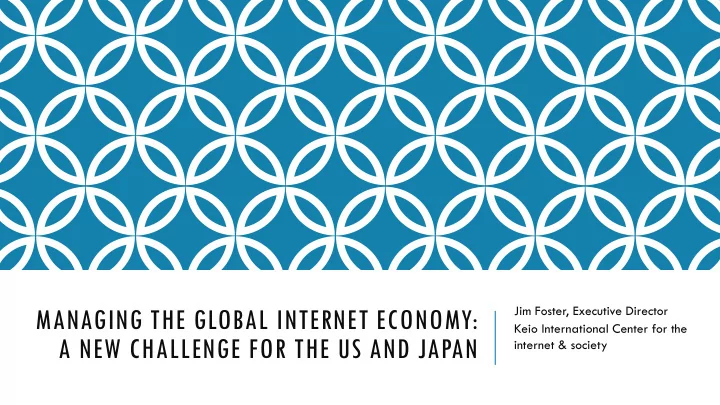

Jim Foster, Executive Director MANAGING THE GLOBAL INTERNET ECONOMY: Keio International Center for the A NEW CHALLENGE FOR THE US AND JAPAN internet & society
WHAT IS THE INTERNET? • A global technology without borders • A distributed, resilient network • Operates at scale • Offers ubiquitous connectivity • Yet threatened by assertions of cyber- sovereignty and dangers of ethnic, linguistic and economic fragmentation
WHAT IS THE INTERNET ECONOMY? • Email and Search • Social Media • E-Commerce • Big Data • Internet of Things • New Business Models (books, broadcasting, music, healthcare, education – and even taxis)
NEW ECONOMY AND NEW ISSUES • Privacy (protecting and sharing data) • Cybersecurity (infrastructure and surveillance) • Content Online (new business models) • Net Neutrality (capacity building) • Competition (the problem of scale) • Standards and Interoperability (global vs. local)
US AND JAPAN PIONEERS ON THE INTERNET • US invented the Internet; Japan first to deploy at scale • Together, we brought the Internet to Asia • Keio U played a special role: invented binary code to display Chinese characters; hosts only root server in Asia; represented Asia at ICANN • But weight is shifting to China and India – by 2025, 80 percent of Internet users will be in Asia and Africa. • Not surprising that Lu Wei, the head of the Chinese Internet Office, is part of the NETMundial Initiative coordinating committee and not someone from Japan.
NEED FOR DEEPER PARTNERSHIP • Rapid expansion in past decade of the US ICT presence in Tokyo (Apple, Facebook, Twitter, Google, Amazon, E-Bay) • New companies and business models in Japan: Softbank, e- Mobile, Yahoo Japan, Mixi, DeNA and Rakuten • US – Japan leadership is important to preserving the openness, transparency and diversity of the Internet in Asia. • But are we up to the challenge – need regional not unilateral or bilateral solutions
ACCJ INTERNET ECONOMY WHITE PAPER • Published in 2009 offered Chamber’s views on how Japan could grow the Internet Economy in cooperation with the US • Extraordinary coalition of US companies that are leaders on the Internet globally (Microsoft, Intel, Amazon, Google, Apple, IBM) • Strong emphasis on bilateral collaboration to promote greater utilization of the Internet in areas such as healthcare, the environment and education with the goal of creating a “virtual” free market in data between Japan and the US. • Final chapter called for US-Japan Dialogue under leadership of State/FCC and MIC with a focus on partnership in building the Internet Economy in Asia.
US/JAPAN INTERNET ECONOMY DIALOGUE • Started in November 2010 under the leadership of US Ambassador Philip Verveer and MIC Minister Kazuhiro Haraguchi; agenda included shared issues such as privacy, spectrum allocation, digital content, cybersecurity, procurement standards and e-commerce regulation. • Since then the Dialogue has met six times, most recently in September of last year; private sector formally joined in 2012, producing reports and recommendations on cloud computing, big data, barriers to cross border data flows, the Internet of Things and Internet governance. • Dialogue has been a spur to closer government to government collaboration at the ITU plenipotentiary meeting, at the OECD and in the WSIS process; supported greater private sector exchange on privacy issues, data localization and cloud security standards, disaster preparedness and cooperation on the 2020 Olympics.
FUTURE AGENDA • Coordinate closely on the IANA/ICANN transition to assure continued integrity of the domain system functions that are the backbone of the Internet. • Encourage greater government and private sector engagement with third countries in the Asia region to remove obstacles to the free flow of data • Build coalitions based on shared values and principle of a free market economy that challenge demands for cyber-sovereignty in the region and avoid risks of fragmentation • Move ahead with cybersecurity collaboration, exploring technology transfers and sharing of best practices • Continue US- Japan cooperation on promoting “open data” in areas like healthcare, education and energy and in managing the “Internet of Things”
GETTING PRIVACY RIGHT IS KEY TEST • Japan currently discussing revisions to its personal information law in Diet; passage expected in May • New law will establish a Data Protection Agency that will set rules for usage of anonymized data, define requirements for repurposing of data, set parameters for input from multistakeholder community and reporting requirements for business, and establish criteria for cross-border data transfers. • To date, there has been a lack of both transparency and broad discussion on the provisions of the law and the way it will be implemented. • US is also developing new provisions for regulating privacy; vital that two countries consult closely on their respective approaches and be mindful that they are a model for the region and beyond; need for a privacy working group under the US-Japan Internet Economy Dialogue.
ROLE OF THE ACADEMIC COMMUNITY To date, US-Japan cooperation on the Internet has centered on closer ties between business and government; need to involve the universities as institutions in researching solutions and developing recommendations APRU (Association of Pacific Rim Universities) recently launched an initiative to promote strengthened ties and more institutionalized consultation between government and academia/think tank community and with businesses in the region Keio University is taking the lead in creating this framework with support from major corporations in the US, Japan, Korea and China as well as a number of foundations Goal is to link university research with the challenges of growing the Internet Economy in the region and to build capacity within governments and civil society on the challenges and issues surrounding the further development of the Internet
Recommend
More recommend